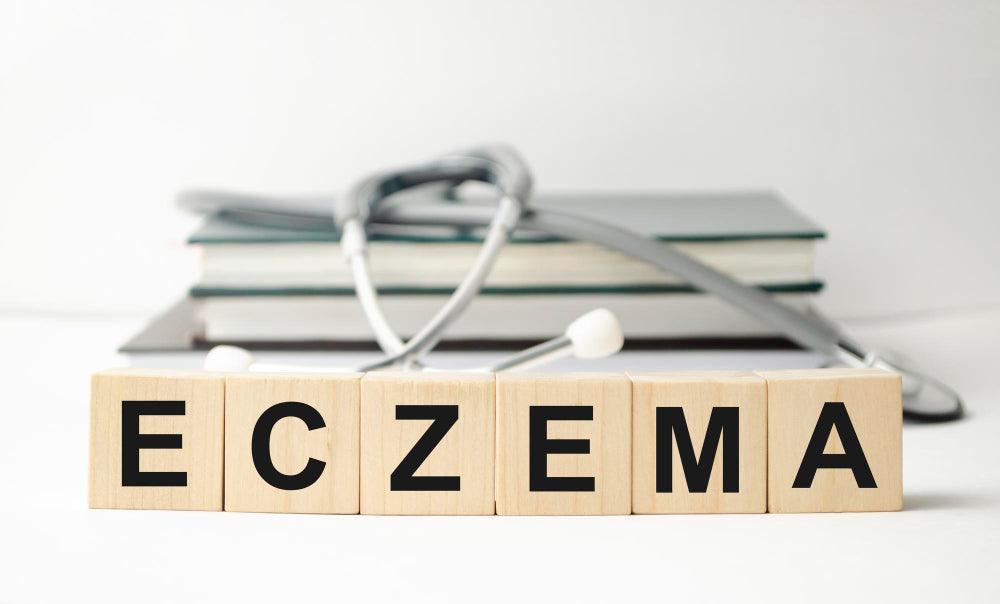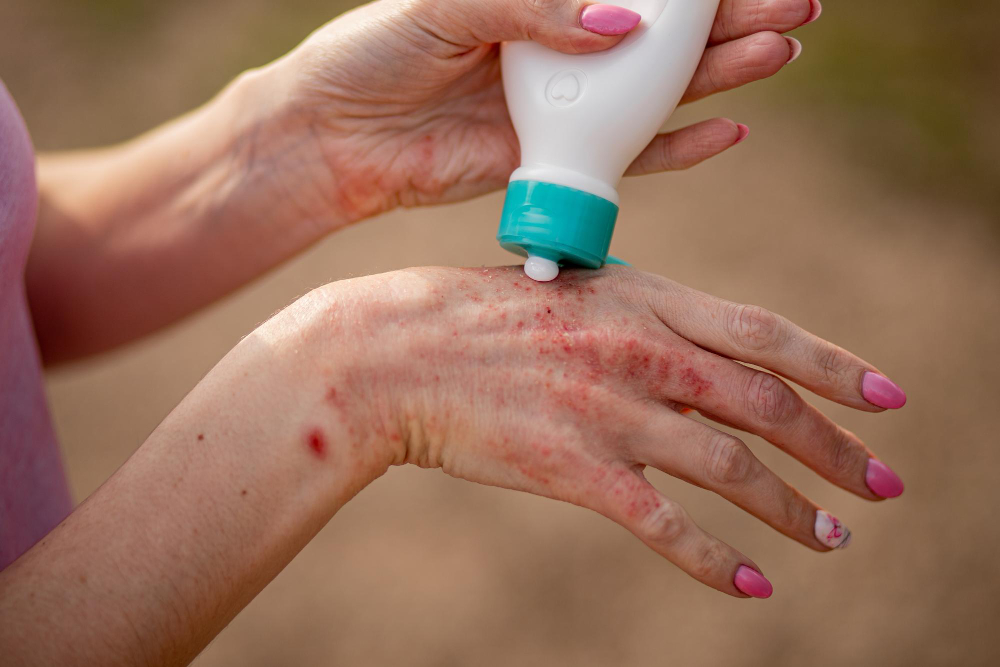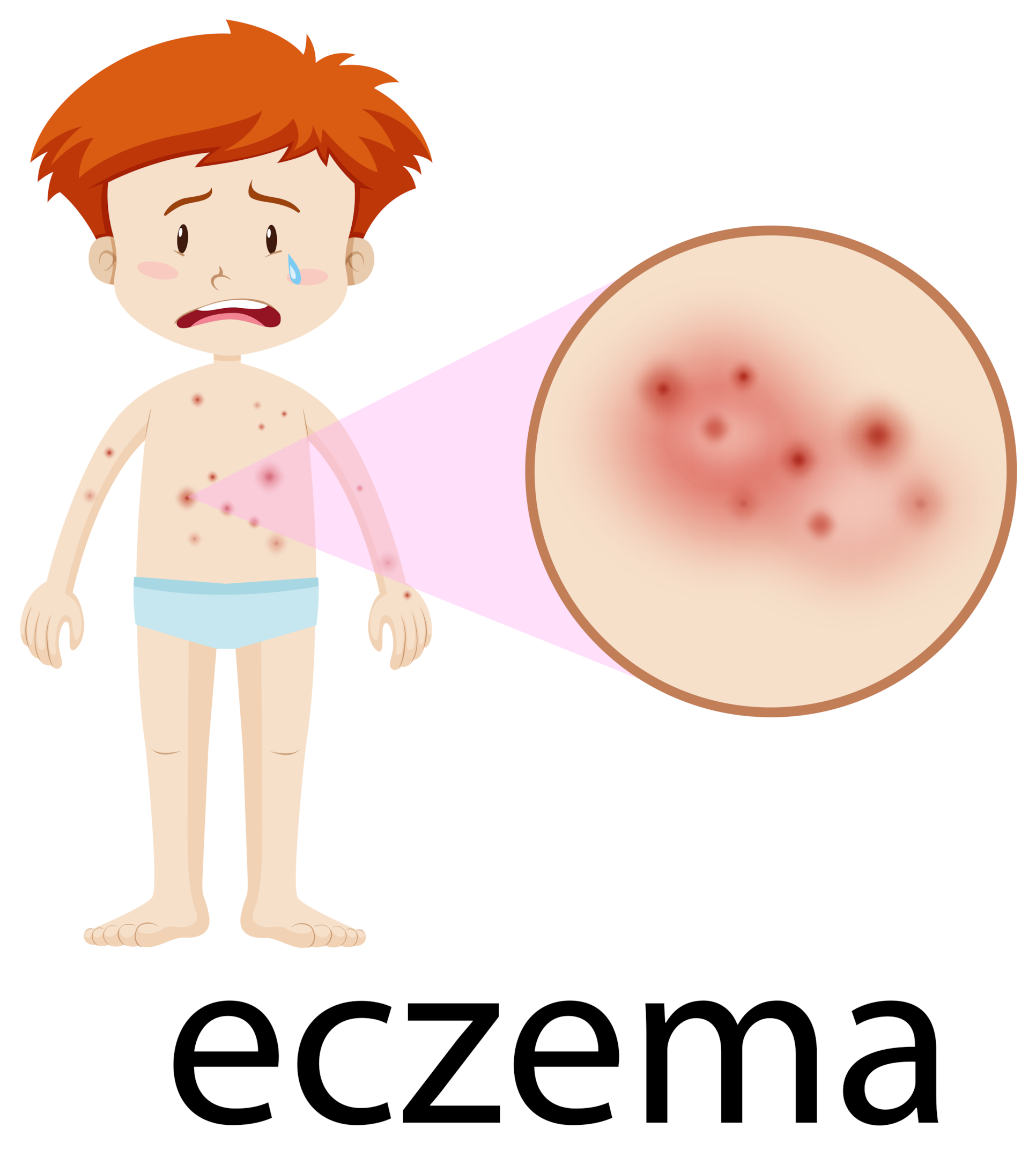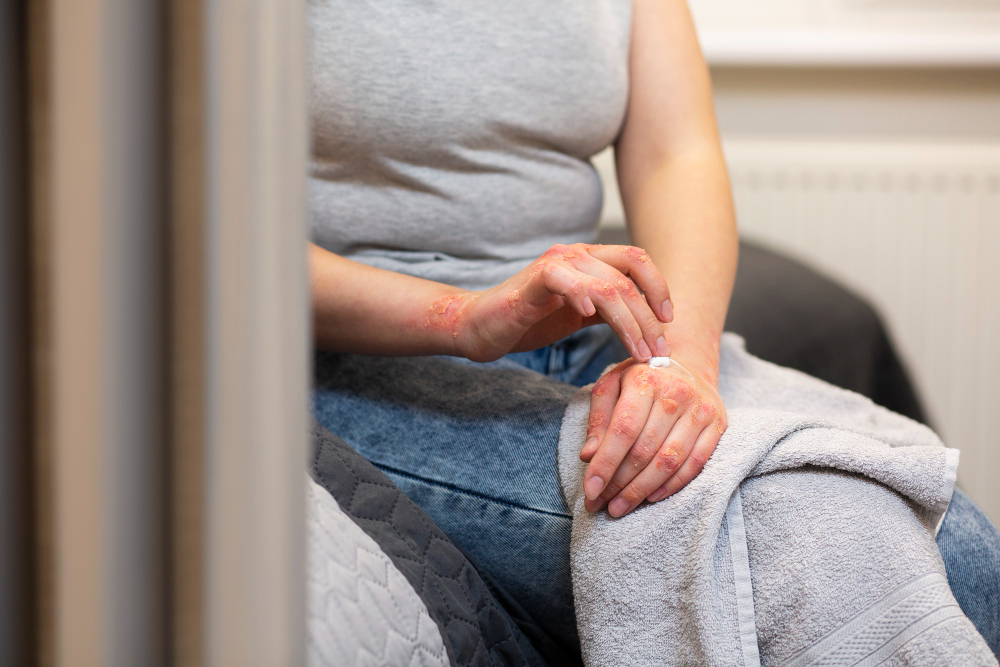Treatment of Eczema


Eczema, otherwise known as Atopic Dermatitis, is a skin disease that causes itching and burning of the skin. It is developed due to an autoimmune reaction. It involves almost the entire skin but is most commonly found on the hands. About 15% of the population is affected by this disease. The onset of the disease occurs mainly in young adults.

The disease is presented with exudative skin patches, red plaque on the skin, and a flare-up of the outermost layer of the skin.
It is associated with asthma, hay fever, pemphigus, and psoriasis in the chronic stage.
Prevention plays a crucial role in the treatment of this disease. Apart from prevention, topical and systemic medications are used to topple the disease.

The causative agent behind eczema is unknown, but it is suggested that substance that triggers autoimmune reactions are the leading cause of eczema. Family history of eczema is more significant in eczema patients. It is considered a genetic disorder and is transferred from parents to children through genes.
You are also at high risk if you have a history of allergies in your family. The affected gene may impair the protein, which helps to maintain healthy skin.
Some environmental factors can also add to the causative agent of eczema. These factors irritate the skin and spark an autoimmune reaction. In addition, stress may also worsen the symptoms of eczema.
Eczema is a condition characterised by Atopic Dermatitis. It's the most common complaint when you say "eczema." In the UK, 5-10% of adults are affected by this type of eczema. In addition, 11-20% of children are also affected by it. Eczema has a link to many allergies such as asthma. It is possible for a trigger to induce irritation. So when the body touches something, it will produce a rash. The triggers can vary depending on the person with eczema.

Symptoms of atopic dermatosis is skin itching and sores. Some individuals have just tiny patches of dry skin and some people experience extensive inflamed skin around their entire body.
Although atopic eczema is common in most areas in children it affects the hands inside and behind the elbow and back of the knee. Often eczema has periods when the symptom appears to be less apparent, as well as those when symptoms become progressively worse (Flareup).
Itching of skin
Patches on the skin
Crusting scars on the skin
Red rashes
Along with this Eczema, patients may suffer from other diseases like allergies, stress, insomnia, loss of appetite, and asthma.

Patients' awareness of the disease is critical. He must know about the causative agent of the diseases. You should avoid those factors which worsen your eczema symptoms. Patients must take care of their skin.
Dry skin can increase the severity of the disease. The patient must keep moisturising his skin with lotions and gels. In addition, dryness creates cracks in eczema-involved skin.
More prolonged exposure to UV sun radiation may be harmful. Therefore it should be avoided. Allergens such as dust and air pollution can spark the autoimmune process.
The people who have eczema in their families must vaccinate their next generation against allergies. Taking a shower more than two times a day can worsen the condition, as wet skin creates a favourable environment for the growth of microbes.
Soap and shampoo should not be used on eczema-involved areas. Cotton clothing is preferable to wear because other fabrics may irritate the skin.
Gels and creams which treat Atopic Dermatitis are considered the most effective against the disease. These medicines help relieve the burning sensation and provide some comfort to the patient.
These creams can contain corticosteroids for topical use of eczema.
Corticosteroids are the medicines most commonly used for topical use. The tough skin should be moisturised with corticosteroid cream twice daily.
Initially, triamcinolone 0.1% is prescribed. Later on, triamcinolone is replaced with hydrocortisone.
Emollients are moisturising substances used for the dry skin of eczema patients. It hydrates the skin and overcomes itching. Different creams and lotions are used as emollients. They contain petroleum jelly and Zinc oxide, which are helpful to protect the dry layer of skin.
It is beneficial for the patient to substitute emollients with corticosteroids. These will sidestep the adverse effects of corticosteroids.
Protopic 0.3% and Elidel 1% can be effective in treating eczema when applied three times a day. However, 40% of patients experience a burning sensation when they apply Elidel cream to their skin, but it is temporary and resolves with continued use.
Elidel and Protopic don't cause side effects like corticosteroids, but they are more expensive than corticosteroids. It can be even applied to the face and eyelids.
The treatment of eczema depends upon the stage of the disease.
Staphylococcus bacteria are excluded from the lesions. A wet dressing is applied to the lesion for 50 minutes to hydrate the skin. Domeboro tablets are dissolved in water and then topically applied to the eczema lesions. The lesions should be bandaged to protect at night time.
These lesions have become dry, but topical medicine should continually be used. However, the dosage should be reduced at this stage of the disease.
Liquor carbonis detergens are added to the treatment at this stage of the disease.
No tests can diagnose eczema. Your physician can diagnose the disease by looking at your skin. Some patients with eczema may need allergy treatment to prevent them from developing any irritants or triggers. Children with eczema often undergo allergy testing.
Consult a GP to determine the symptoms. Usually, a doctor can assess skin problems including atopic dermatitis using an allergy test and asking questions.
Systemic medicine is prescribed when the disease becomes severe. Prednisone at a 1 mg/kg rate is given for 2-4 weeks. Prednisone given orally is enough to subside the severity of the disease. Along with prednisone, other steroid medications such as hydroxyzine and doxepin are also used for systemic treatment.
Fissures found on skin indicate a Staphylococcus infection. Staphylococcus infections can be treated with several antibiotics. Penicillin, doxycycline, and amoxicillin are used in treating bacterial infections. In case of penicillin allergy, penicillin is replaced with azithromycin.
Patients should be regularly monitored for the side effects of the drugs. Corticosteroids can suppress the immune system of the patient. It may also suppress the cortisol level of the body. Medicines used in the cream form may also invoke an allergic reaction when applied to the involved skin.
Other complications include dark marks on the skin, cardiac problems, and rash.
Symptoms aren’t necessarily caused by skin infections. Some people think eczema can become infectious because the infection often occurs in the family. Eczema is caused by many different factors like genes, environmental factors, and other factors that can affect skin barrier. Eczema may also cause painful infection due to scratching. Eventually, this will destroy the skin barrier and may cause infection as well.
Treatment is very effective in patients with the disease confined to the hand. The symptoms are relieved in a few dosages of medication. However, poor prognosis occurs in patients with persistent symptoms into adulthood, in which the disease is generalised.
To learn more about eczema and see our range of treatments, click here.
For a full range of blood tests and medications, visit our Welzo Online Pharmacy Page. For more details, click here.










Plus get the inside scoop on our latest content and updates in our monthly newsletter.